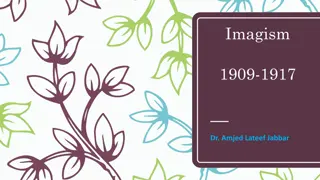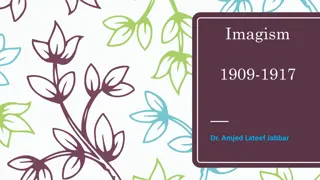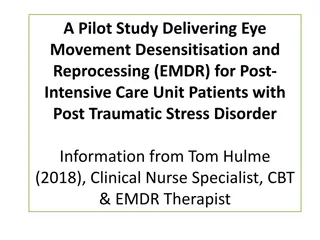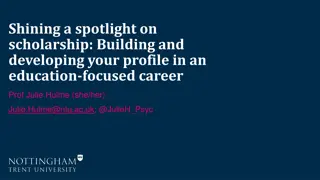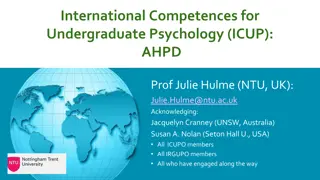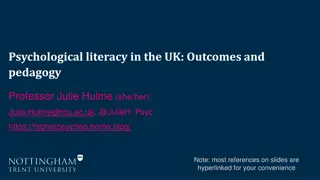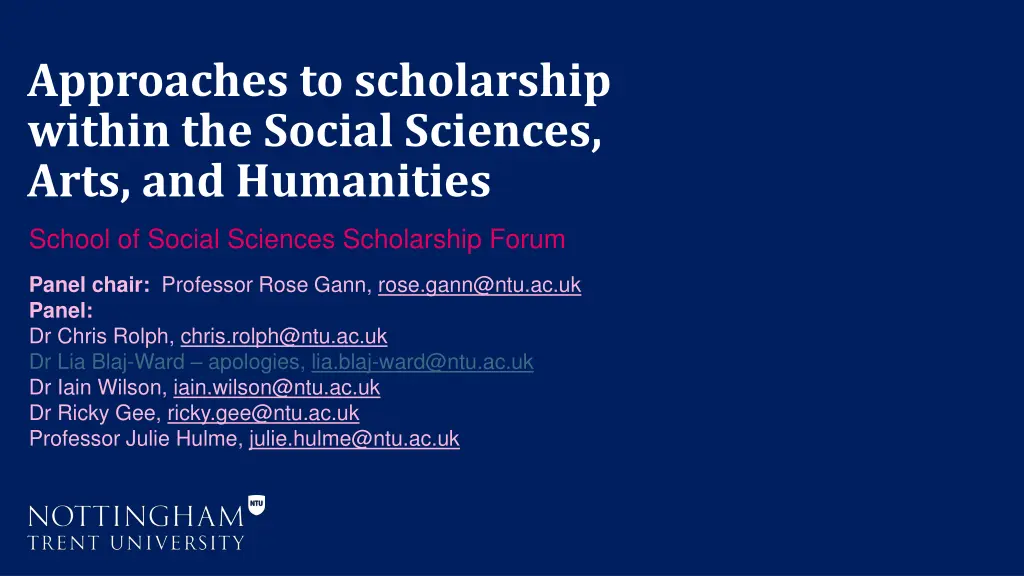
Understanding Marginalized Education-Focused Academics
Explore the experiences of marginalized Education-Focused Academics (EFAs) in UK higher education institutions through a study conducted by researchers who also identify as marginalized EFAs themselves. The study delves into the career development and social identity of EFAs, shedding light on challenges they face and how their academic careers unfold. Preliminary findings suggest origins in happenstance and multifaceted roles that EFAs undertake.
Download Presentation

Please find below an Image/Link to download the presentation.
The content on the website is provided AS IS for your information and personal use only. It may not be sold, licensed, or shared on other websites without obtaining consent from the author. If you encounter any issues during the download, it is possible that the publisher has removed the file from their server.
You are allowed to download the files provided on this website for personal or commercial use, subject to the condition that they are used lawfully. All files are the property of their respective owners.
The content on the website is provided AS IS for your information and personal use only. It may not be sold, licensed, or shared on other websites without obtaining consent from the author.
E N D
Presentation Transcript
Approaches to scholarship within the Social Sciences, Arts, and Humanities School of Social Sciences Scholarship Forum Panel chair: Professor Rose Gann, rose.gann@ntu.ac.uk Panel: Dr Chris Rolph, chris.rolph@ntu.ac.uk Dr Lia Blaj-Ward apologies, lia.blaj-ward@ntu.ac.uk Dr Iain Wilson, iain.wilson@ntu.ac.uk Dr Ricky Gee, ricky.gee@ntu.ac.uk Professor Julie Hulme, julie.hulme@ntu.ac.uk
Scholarship Case Study Chris Rolph 2019 any work that aims to understand or enhance an aspect of higher education. It is shared publicly, it can be evaluated, and it is implemented by other people. 2016 2022 2024
Iain Wilson PhD C.Psycol SFHEA (iain.Wilson@ntu.ac.uk) 07/07/2025
Career development stories and identity for marginalised education-focused academics Dr Ricky Gee Prof Julie Hulme (she/her) With thanks to NTU Psychology for seedcorn funding. With thanks to Owen Wilkinson for research assistant support.
Introduction Both numbers and proportions of education-focused academics (EFA; e.g. Teaching and Scholarship pathway at NTU) have increased across the sector since 2012 (approx. 250,000 now). There are multiple reports of stigmatisation among this group relative to those classified as active researchers, e.g. Hulme (2022). Promotion is known to be highly challenging. People with marginalised characteristics are over- represented in this group. How do marginalised EFAs experience their academic careers? How can this be explained in terms of career development theory (e.g. Oldridge & Gee, 2023) and/or social identity theory (Tajfel & Turner, 1979)? WonkHE: https://wonkhe.com/wonk-corner/hesa- spring-2024-staff-in-outline/
Methods Both researchers identify as marginalised EFAs themselves, in different ways. Participants = 11 EFAs who were employed in UK higher education institutions in 2024 as Senior Lecturers, Principal Lecturers, Associate Professors/Readers. All self-identified as marginalised in some way, e.g. ethnicity, gender/sexuality, disability, socioeconomic background. Semi-structured interviews (60-90 minutes) conducted over MS Teams, recorded and transcribed. Reflexive thematic analysis (Braun & Clarke, 2022).
Results (preliminary themes) Origins in happenstance EFAs accidentally/opportunistically found themselves taking a teaching- focused job early in their career, enjoyed it and realised they were good at it so agentically chose to continue. It becomes part of their identity. This sometimes also ties in with lack of ability to move, and so reduced opportunities to leave. Jack/y of all trades often had to take on lots of different teaching roles, fill the gaps and so see themselves as flexible and versatile, but can also sometimes miss identifying their specialism and expertise. Emotional labour minoritised EFAs frequently spoke of being involved in EDI work, supporting others, especially those who are also minoritised, and other EFAs. They want to change culture and create parity of esteem, but this can be emotionally burdensome. Economy of care they talk about having encountered barriers and blockages, but finding a sponsor who helped them to develop and progress. They are now paying it forward .
Implications EFA expertise is can be under-appreciated both by universities and sometimes by EFAs themselves. Intersectionality of marginalised identity with EFA status. Universities can recognise educational contributions more, and consider providing additional support (mentoring, coaching) for marginalised EFAs. Importance of recognising that the decision to become an EFA may at first be opportunistic, but for many, it becomes a central feature of professional identity, and an expression of a commitment to social justice. EFAs are agentically following a vocation, not stuck in a career that they perceive as a road to nowhere we need to support development and progression, not try and persuade them to become researchers! Marginalised EFAs as positive disruptors (Hulme, 2022) who care, and who take responsibility for equity, inclusion, organisational culture. Universities must ensure that this good will is both valued and not taken for granted monitor and provide support for compassion fatigue, recognise the costs. Processes that recognise and reward citizenship and collegiality (as per Hulme et al., 2025).
Thank you! Conclusion: any work that aims to understand or enhance an aspect of higher education. It is shared publicly, it can be evaluated, and it is implemented by other people. Scholarship can look different for different individuals and in different contexts. Please share your questions, thoughts, comments we all learn from discussing with each other!
Thank you! ntu.ac.uk

